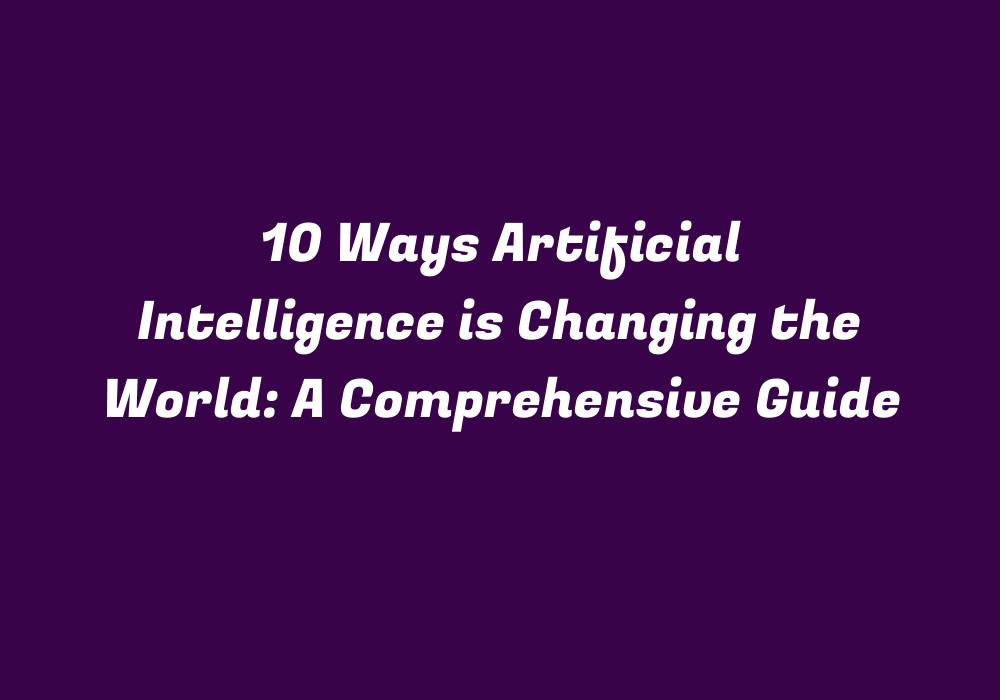Introduction
Artificial Intelligence (AI) has been a topic of intense interest for decades, but in recent years, it has quickly grown from being an abstract concept to becoming an indispensable part of our lives. Today, AI touches almost every aspect of human existence and continues to reshape the world as we know it. In this comprehensive guide, we delve into 10 ways artificial intelligence is changing the world and its impact on various industries, businesses, and daily life.
1. Advances in Medical Diagnosis
Medicine has experienced a significant transformation through AI-powered tools that are capable of analyzing medical imaging data with remarkable accuracy. AI algorithms can recognize patterns within these images, enabling faster and more precise diagnoses for healthcare professionals. This technology not only improves patient outcomes but also enhances the efficiency of medical facilities worldwide by allowing doctors to focus on providing individualized treatment plans.
2. Revolutionizing Transportation
The transportation industry is undergoing a major transformation, with AI being instrumental in developing self-driving vehicles and improving traffic management systems. Autonomous vehicles are expected to revolutionize urban mobility, reducing traffic congestion and potentially leading to reduced accidents caused by human error. Additionally, real-time traffic monitoring and optimized route planning can help reduce travel time for both personal and commercial purposes, promoting a more efficient transportation ecosystem.
3. Enhancing Education and Learning
AI is being utilized in various forms of education to improve the learning experience. It allows educators to cater to individual student needs by adapting lesson plans based on each student’s progress, providing personalized guidance for better understanding and retention of material. With the help of AI-powered virtual assistants, students can receive immediate feedback and access information whenever they need it. Moreover, AI-based language translation tools are bridging communication gaps between teachers and students from diverse linguistic backgrounds in multilingual classrooms.
4. Boosting E-commerce and Customer Service
AI has significantly enhanced e-commerce by streamlining the shopping experience for customers. Chatbots, for instance, provide instant support to online shoppers while gathering information about their preferences to optimize future experiences and make personalized recommendations. These intelligent systems are also capable of processing vast amounts of data, enabling retailers to gain valuable insights into consumer behavior and tailor marketing strategies accordingly.
5. Enhancing Agriculture and Food Production
AI has the potential to transform agriculture by improving crop yield, optimizing resource usage, and minimizing waste in food production processes. AI algorithms can analyze weather patterns, soil conditions, and historical data to predict ideal planting times and optimal growing strategies. Additionally, precision farming tools enable farmers to monitor their crops more effectively, leading to higher yields while reducing water consumption, pesticide use, and overall environmental impact.
6. Strengthening Cybersecurity
Artificial intelligence can help combat the ever-evolving cyber threats by identifying patterns in malicious activities and recognizing potential risks before they materialize. AI-driven security systems can quickly analyze large amounts of data to detect anomalies, alert administrators to unusual behavior, and block unauthorized access attempts. By continuously monitoring digital networks, these systems enhance the overall defense capabilities of organizations, preventing costly breaches and safeguarding sensitive information.
7. Improving City Planning and Infrastructure
AI-driven algorithms can analyze vast amounts of urban data to assist city planners in making more informed decisions about infrastructure improvements, resource allocation, and sustainable development initiatives. These systems can also optimize traffic flow by identifying bottlenecks and recommending alternative routes to minimize congestion. By using AI to analyze demographic trends and environmental factors, urban planning can become more effective in addressing the unique needs of residents while promoting a more livable and efficient cityscape.
8. Revolutionizing Energy Management
AI-powered solutions are playing a crucial role in the development of renewable energy sources by optimizing grid management, minimizing waste, and maximizing efficiency. These intelligent systems can analyze real-time data on power generation and consumption to predict fluctuations in demand, enabling quick adjustments that help maintain a stable balance between supply and demand. With AI-enabled smart grids, the energy sector is paving the way for more sustainable and cost-effective solutions in the years to come.
9. Boosting the Creative Industry
Artificial intelligence is not only revolutionizing the technical aspects of various industries but also influencing creative fields like art, music, and filmmaking. AI-generated artwork has demonstrated unique perspectives and styles that can complement or even challenge human creativity. Moreover, AI-assisted tools are being used to generate musical compositions, providing a platform for artists to experiment with new sounds and melodies. These advancements are expanding the boundaries of artistic expression and encouraging further innovation in creative industries.
10. Enhancing Human Interactions
Finally, AI is playing a significant role in improving human interactions by augmenting communication and enabling better understanding between individuals with different abilities or backgrounds. Language translation tools help bridge language barriers, while assistive technologies cater to the needs of people with disabilities, ensuring greater accessibility and inclusivity for all. By facilitating stronger connections among diverse groups of people, AI can foster a more empathetic, compassionate, and globally connected society.
Conclusion
Artificial Intelligence is undoubtedly reshaping various aspects of our world, with its applications spanning across numerous industries and aspects of daily life. As the technology continues to evolve, it will likely bring about even greater changes that shape the future in unprecedented ways. It is imperative to understand these transformations and their potential consequences for both individuals and society at large, embracing a mindset of adaptation and openness to new possibilities brought forth by this remarkable technological revolution.
